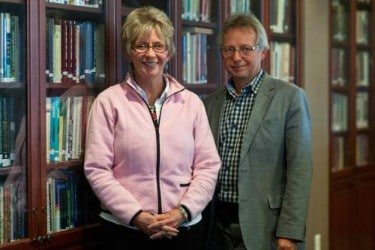
Quotes by authors Terryl and Fiona Givens


“A problem related to perceptions of Mormonism’s monopoly on truth is the impression that Mormons claim a monopoly on salvation. It grows increasingly difficult to imagine that a body of a few million, in a world of seven billion, can really be God’s only chosen people and heirs of salvation. That is because they aren’t. One of the most unfortunate misperceptions about Mormonism is in this tragic irony: Joseph Smith’s view is one of the most generous, liberal and universalist conceptions of salvation in all Christendom.”



“No man woman can remain in this church on borrowed light. However, in 1945, a Church magazine urged upon its readers the exact opposite, that ‘When our leaders speak, the thinking has been done.’ Many are familiar with that expression; fewer are aware that when President George Albert Smith learned of it, he immediately and indignantly repudiated the statement. ‘Even to imply that members of the Church are not to do their own thinking,’ he wrote, ‘is grossly to misrepresent the true ideal of the Church.”

“‘Repentance will be possible even after death,’ wrote James E. Talmage. To some, he continued, ‘it may appear that to teach the possibility of repentance beyond the grave may tend to weaken belief in the absolute necessity of repentance and reformation in this life. There is no reason for such objection,’ he explains, when we consider that willful neglect here and now will render the process that much more lengthy and difficult in the future…Our error here, once again, may be in adopting a language of salvation as either/or, as an event that transpires rather than a process that unfolds.”

“Our deepest healing seldom comes in the ways or modes that we envision. What we think we need to be happy and whole is not always what the Healer knows we need to be happy and whole. Solutions that seem obvious to us may be distractions from where the deepest pain lies…
“A loving Savior does all he can to help us choose the most fulfilling and most healing pathway; the precepts with which he provides us are for our liberation and not our confinement. It all comes down to trust. ‘The servant knoweth not what his lord doeth,’ he tells his disciples, ‘but I have called you friends.’ Friends trust each other.”

“Section 10 of the Doctrine and Covenants contains a rather remarkable reassurance. The date is April 1829, a year before the Church was restored. In this revelation, the Lord refers consistently to his Church as something that already exists. The Restoration, he says, will not ‘destroy that which my people have already received.’ ‘Therefore,’ he continues, ‘whosoever belongeth to my church [in 1829] need not fear, for such shall inherit the kingdom of heaven.’ Those who belong to his church, he tells us, will receive more light. In his words, ‘a part of my gospel’ will be theirs. But this will not, he repeats reassuringly, ‘destroy my church, but I say this to build up my church.'”

“‘Hearken unto my voice. Listen to him who is the advocate with the Father, who is pleading your cause before him…that [you] may come unto me and have everlasting life.’
“What, exactly, is meant by this verse? We are happy to know we have an advocate, but we would hope our Father is not in need of heart softening. It may be that we misunderstand the term advocate the way it is being used here…We see that Christ as the atoning one — the mediator — is not our defender from God’s justice, but the collaborator in and minister of our Heavenly Father’s plan.”
